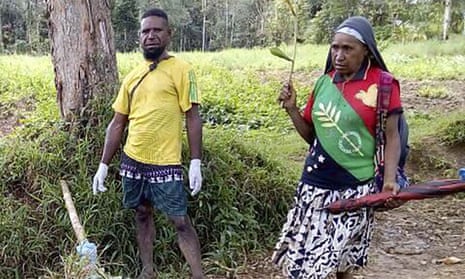The brutal deaths of about 30 women and children in Papua New Guinea’s highlands amount to the “worst payback killing” in the country’s history, the police minister has said.
Bryan Kramer made the declaration after visiting Hela province, where 16 people were slaughtered by rival clansmen who the prime minister, James Marape, described as “warlords”.
The motive for the massacre was unclear last week, and the total death toll from a series of attacks had also varied, according to reports.
Following a one-day trip to the area, Kramer said it appeared warring clans had taken the rare step of targeting women and children after the elderly mother of a tribe leader was killed in an earlier raid.
He described “the horrific killing of 23 women ([two] of whom were pregnant) and [nine] children” as the “worst payback killing in our country’s history”.
While tribal violence is a long-standing issue in the area, attacks on women and children were essentially unprecedented, authorities and locals have said.
In a statement on Facebook, Kramer said he was told the most recent outbreak of violence centred around the warring Oi Kiru and Libe tribes.
A key Libe clansman was killed in June, sparking a revenge attack in which six Oi Kiru members died, including the mother of the clan’s leader, he said, adding that it was the “first killing of an elderly mother”.
Kramer said high-powered rifles were then used in a payback killing at a small village, Peta, in which three women and three children were killed.
That led to the worst single incident, with a group of young men raiding the Karida village in the early hours last Monday, using machetes to kill nine women and seven children. Two of the women were pregnant, Kramer said.
This article includes content provided by Facebook. We ask for your permission before anything is loaded, as they may be using cookies and other technologies. To view this content, click 'Allow and continue'.
Philip Pimua, the officer in charge of the Karida sub-health centre, previously told the Guardian the victims were “cut into pieces”. “Some had body parts we couldn’t recognise which one is which one, only the faces we can recognise, but legs, hands…”
Those responsible had reportedly fled the province, Kramer said, while the Karida locals had said they would not retaliate following his visit to the area.
“High-level discussions on a strategic deployment action plan with the use of drone technology and satellite surveillance, will be used to track and apprehend those on the run,” he said.
“An intelligence unit will also be established to gather information from the community.”
The Marape government sent in the defence force in response to the escalating violence last week, while the United Nations called for an immediate intervention to bring the perpetrators to justice.
Describing the Karida massacre last week as “one of the saddest day of my life”, Marape vowed to use the “strongest measures in law” to punish the perpetrators.
Comment was sought from Kramer.
